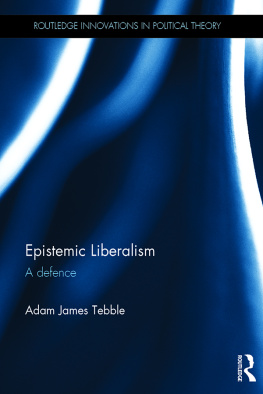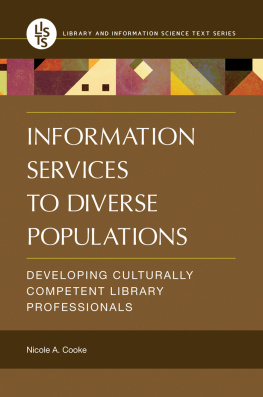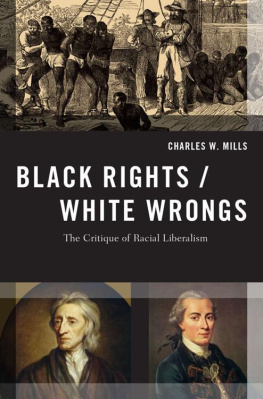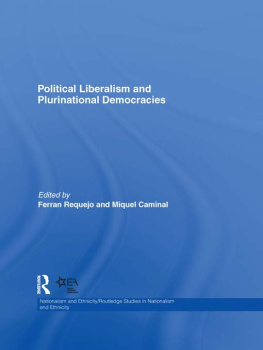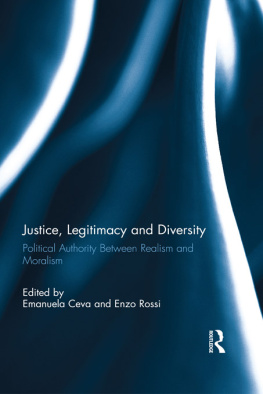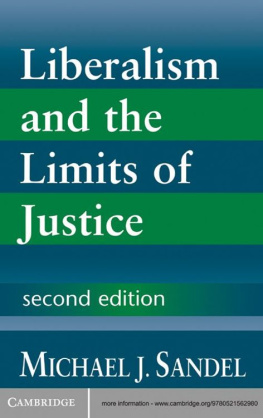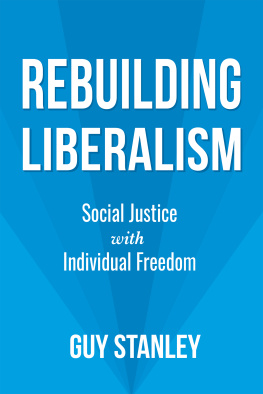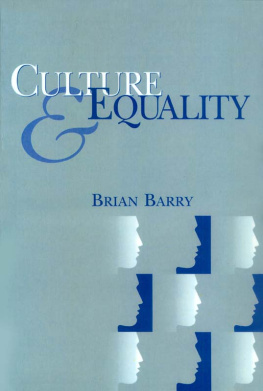Epistemic Liberalism
In the wake of what has come to be called the cultural turn, it is often asked how the state should respond to the different and sometimes conflicting justice claims made by its citizens and what, ultimately, is the purpose of justice in culturally diverse societies.
Building upon the work of a diversity of theorists, this book demonstrates that there is a distinct epistemic tradition of liberalism that can be used to critique contemporary responses to cultural diversity and their underlying principles of justice. It critically examines multicultural, nationalist and liberal egalitarian approaches and argues that an epistemic account of liberalism, that emphasises social complexity rather than cultural diversity or homogeneity, is the most appropriate response to the question of justice in modern culturally diverse societies.
Epistemic Liberalism will be of interest to students and scholars of contemporary political theory and philosophy, liberal political theory and the politics of culture and identity.
Adam James Tebble is Lecturer in Political Theory at Kings College London.
Routledge Innovations in Political Theory
1 A Radical Green Political Theory
Alan Carter
2 Rational Woman
A feminist critique of dualism
Raia Prokhovnik
3 Rethinking State Theory
Mark J. Smith
4 Gramsci and Contemporary Politics
Beyond pessimism of the intellect
Anne Showstack Sassoon
5 Post-Ecologist Politics
Social theory and the abdication of the ecologist paradigm
Ingolfur Blhdorn
6 Ecological Relations
Susan Board
7 The Political Theory of Global Citizenship
April Carter
8 Democracy and National Pluralism
Edited by Ferran Requejo
9 Civil Society and Democratic Theory
Alternative voices
Gideon Baker
10 Ethics and Politics in Contemporary Theory
Between critical theory and post-Marxism
Mark Devenney
11 Citizenship and Identity
Towards a new republic
John Schwarzmantel
12 Multiculturalism, Identity and Rights
Edited by Bruce Haddock and Peter Sutch
13 Political Theory of Global Justice
A cosmopolitan case for the world state
Luis Cabrera
14 Democracy, Nationalism and Multiculturalism
Edited by Ramn Maiz and Ferrn Requejo
15 Political Reconciliation
Andrew Schaap
16 National Cultural Autonomy and Its Contemporary Critics
Edited by Ephraim Nimni
17 Power and Politics in Poststructuralist Thought
New theories of the political
Saul Newman
18 Capabilities Equality
Basic issues and problems
Edited by Alexander Kaufman
19 Morality and Nationalism
Catherine Frost
20 Principles and Political Order
The challenge of diversity
Edited by Bruce Haddock, Peri Roberts and Peter Sutch
21 European Integration and the Nationalities Question
Edited by John McGarry and Michael Keating
22 Deliberation, Social Choice and Absolutist Democracy
David van Mill
23 Sexual Justice / Cultural Justice
Critical perspectives in political theory and practice
Edited by Barbara Arneil, Monique Deveaux, Rita Dhamoon and Avigail Eisenberg
24 The International Political Thought of Carl Schmitt
Terror, liberal war and the crisis of global order
Edited by Louiza Odysseos and Fabio Petito
25 In Defense of Human Rights
A non-religious grounding in a pluralistic world
Ari Kohen
26 Logics of Critical Explanation in Social and Political Theory
Jason Glynos and David Howarth
27 Political Constructivism
Peri Roberts
28 The New Politics of Masculinity
Men, power and resistance
Fidelma Ashe
29 Citizens and the State
Attitudes in Western Europe and East and Southeast Asia
Takashi Inoguchi and Jean Blondel
30 Political Language and Metaphor
Interpreting and changing the world
Edited by Terrell Carver and Jernej Pikalo
31 Political Pluralism and the State
Beyond sovereignty
Marcel Wissenburg
32 Political Evil in a Global Age
Hannah Arendt and international theory
Patrick Hayden
33 Gramsci and Global Politics
Hegemony and resistance
Mark McNally and John Schwarzmantel
34 Democracy and Pluralism
The political thought of William E. Connolly
Edited by Alan Finlayson
35 Multiculturalism and Moral Conflict
Edited by Maria Dimova-Cookson and Peter Stirk
36 John Stuart Mill Thought and Influence
The saint of rationalism
Edited by Georgios Varouxakis and Paul Kelly
37 Rethinking Gramsci
Edited by Marcus E. Green
38 Autonomy and Identity
The politics of who we are
Ros Hague
39 Dialectics and Contemporary Politics
Critique and transformation from Hegel through post-Marxism
John Grant
40 Liberal Democracy as the End of History
Fukuyama and postmodern challenges
Chris Hughes
41 Deleuze and World Politics
Alter-globalizations and nomad science
Peter Lenco
42 Utopian Politics
Citizenship and practice
Rhiannon Firth
43 Kant and International Relations Theory
Cosmopolitan community building
Dora Ion
44 Ethnic Diversity and the Nation State
National cultural autonomy revisited
David J. Smith and John Hiden
45 Tensions of Modernity
Las Casas and his legacy in the French Enlightenment
Daniel R. Brunstetter
46 Honor
A phenomenology
Robert L. Oprisko
47 Critical Theory and Democracy
Essays in honour of Andrew Arato
Edited by Enrique Peruzzotti and Martin Plot
48 Sophocles and the Politics of Tragedy
Cities and transcendence
Jonathan N. Badger
49 Isaiah Berlin and the Politics of Freedom
Two Concepts of Liberty

